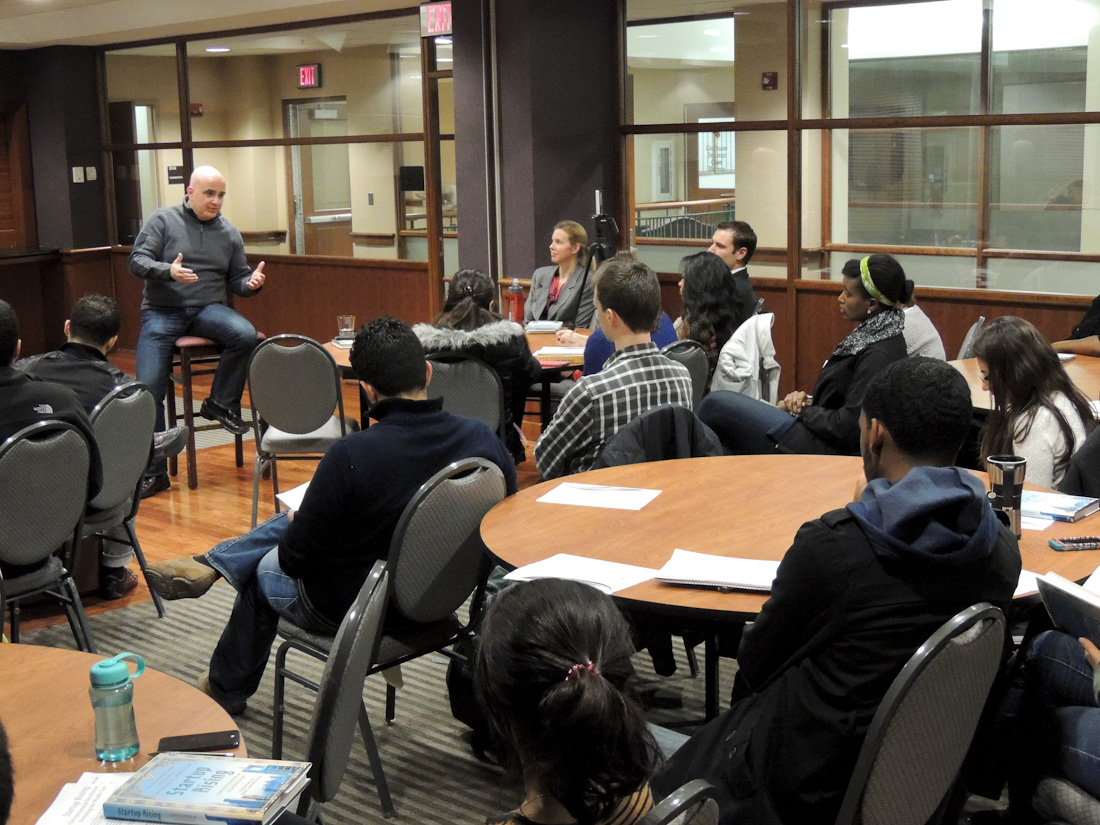
For years, much of the American conversation about the Middle East has revolved around stories of violence, religious conflict, and political turmoil. Chris Schroeder, on the other hand, is intent on shedding light on a burgeoning trend in the region that receives far less media attention: entrepreneurship. In his new book, Startup Rising: The Entrepreneurial Revolution Remaking the Middle East, Schroeder sets out to accomplish just that and on November 12, Smith students had the unique opportunity to hear directly from Schroeder about this quietly emerging industry as he came to the University of Maryland's Robert H. Smith School of Business to discuss his experiences in the field.
A few years ago, Schroeder, a successful entrepreneur and investor himself, did not travel to the Middle East with the intention of authoring his first book about the region’s largely unknown technological boom. That being said, once he was exposed to the culture at the 2010 Celebration of Entrepreneurship in Dubai, he was hooked. After publishing an op-ed about the event in the Washington Post, Schroeder received an immense amount of support for his shining a light on the flourishing tech startup culture in the region. Three years later, Startup Rising, is on bookshelves everywhere.
The event, hosted by the Center for International Business Education and Research (CIBER), drew a large crowd of undergraduate and graduate Smith students interested in both entrepreneurship and emerging markets, who were left with plenty to think about concerning the future of the global economy. As CIBER Director Kislaya Prasad accurately stated in his introductory remarks, “[Startup Rising] reshapes the way you think about the Middle East.”
Prasad’s comments closely reflected Schroeder’s objective in writing Startup Rising, as he passionately spoke about the need to overcome the “narrative bias” so frequently associated with reports out of the Middle East. With a refreshing perspective, Schroeder’s book paints a picture of the Middle East that is often overlooked by popular western news outlets – one of hope, innovation and promise rather than instability and conflict.
In particular, Schroeder organized the types of startup companies coming out of the region into three categories: improvisers, problem solvers, and global players. These categories, he explained, represent the wide range of development and innovation that is occurring, from companies that are applying existing technology to local environments (improvisers) to brand new ideas that can be applicable to consumers all over the world (global players). Schroeder told stories about a number of inspiring entrepreneurs that he met during his travels in the Middle East, describing how the often misunderstood region has become a hotbed for technological innovation and entrepreneurship.
While the book focuses on the activity in the Middle East, Schroeder was quick to point out that this is a developing trend all over the world. The growing number of entrepreneurs in unlikely regions of the world is a sign of a new “bottom up problem-solving” initiative that has been made possible by the rapid growth of mobile technology, Schroeder explained.
Following his speech, Schroeder engaged with students in a vibrant and interactive question and answer period, where he shared valuable insights about his experience in the Middle East and his thoughts about the future of the industry. After the discussion, Schroeder conversed with students while signing copies of his new book.
All of the proceeds from book sales will be donated to Ruwwad, a community empowerment initiative that helps disadvantaged communities in the Middle East overcome marginalization through youth activism, civic engagement, and education.
- Patrick Gillece, Smith MBA Candidate 2015, Office of Marketing Communications
Media Contact
Greg Muraski
Media Relations Manager
301-405-5283
301-892-0973 Mobile
gmuraski@umd.edu
About the University of Maryland's Robert H. Smith School of Business
The Robert H. Smith School of Business is an internationally recognized leader in management education and research. One of 12 colleges and schools at the University of Maryland, College Park, the Smith School offers undergraduate, full-time and flex MBA, executive MBA, online MBA, business master’s, PhD and executive education programs, as well as outreach services to the corporate community. The school offers its degree, custom and certification programs in learning locations in North America and Asia.